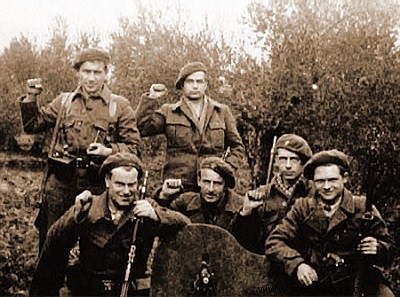
Despite everything, the organization of international brigades is developing. In November 1937 the 13th was born, composed mostly of Poles. In December, a Jewish company was formed, called “Naftali Botwin”. It has its own flag, publishes a newspaper in Yiddish. Its leader, Karl Gutmann, will be killed in action. In February 1938, here is the 129th international brigade composed half of Slavs, half of Spaniards. Its leader, Komar, is now a general in the Polish army. In the spring of 1938, there was a major reorganization:• the volunteers were grouped by nationality in order to facilitate the tasks of the command and their number made it possible to form two divisions, the 35th and the 45th, made up mostly of foreigners.
In January 1937, the 14th brigade was engaged near Segovia to try to decongest the northern front, in June of the same year, the 12th and 149th attacked in Aragon. General Lukacz, commanding the 45th Division, is killed. These two offensives failed.
In July, all the international brigades, under the command of the Spanish generals Modesto and Jurado, achieved a short-lived success in Brunete, Castile, west of Madrid. In August, identical attempt at Belchite. At the end of October, the Francoists entered Asturias. From December 1937 to February 1938, the international brigades were in the front line in the great battle of Teruel, in March-April, in that of Aragon.
In both cases, after important initial successes, the Republicans, inferior in number, but especially in material, failed.
The last battle of the "internationals" will be a success:the passage of the 'Ebro on a front of 60 kilometers and an advance of 20 kilometers in depth, around Gandesa.
The French particularly stand out. Among them, Henri Rol, who will become Colonel Rol-Tanguy and will receive, with General Leclerc, in August 1944, the capitulation of General von Choltitz in Paris; the metalworker Henri Georges, who would become Colonel Fabien, one of the heroes of the Resistance, killed on the Alsace front in 1945.
But the Spanish republican government of Dr Juan Negrin, convinced of no longer being able to prevail, seeks a peace of compromise. At the S.D.N., we negotiate the gradual departure of foreigners from each camp. As a token of goodwill, Negrin decides on the departure of the brigades. October 28, 1938. in Barcelona. the “internationals” leave Spain, cheered, covered with flowers.
